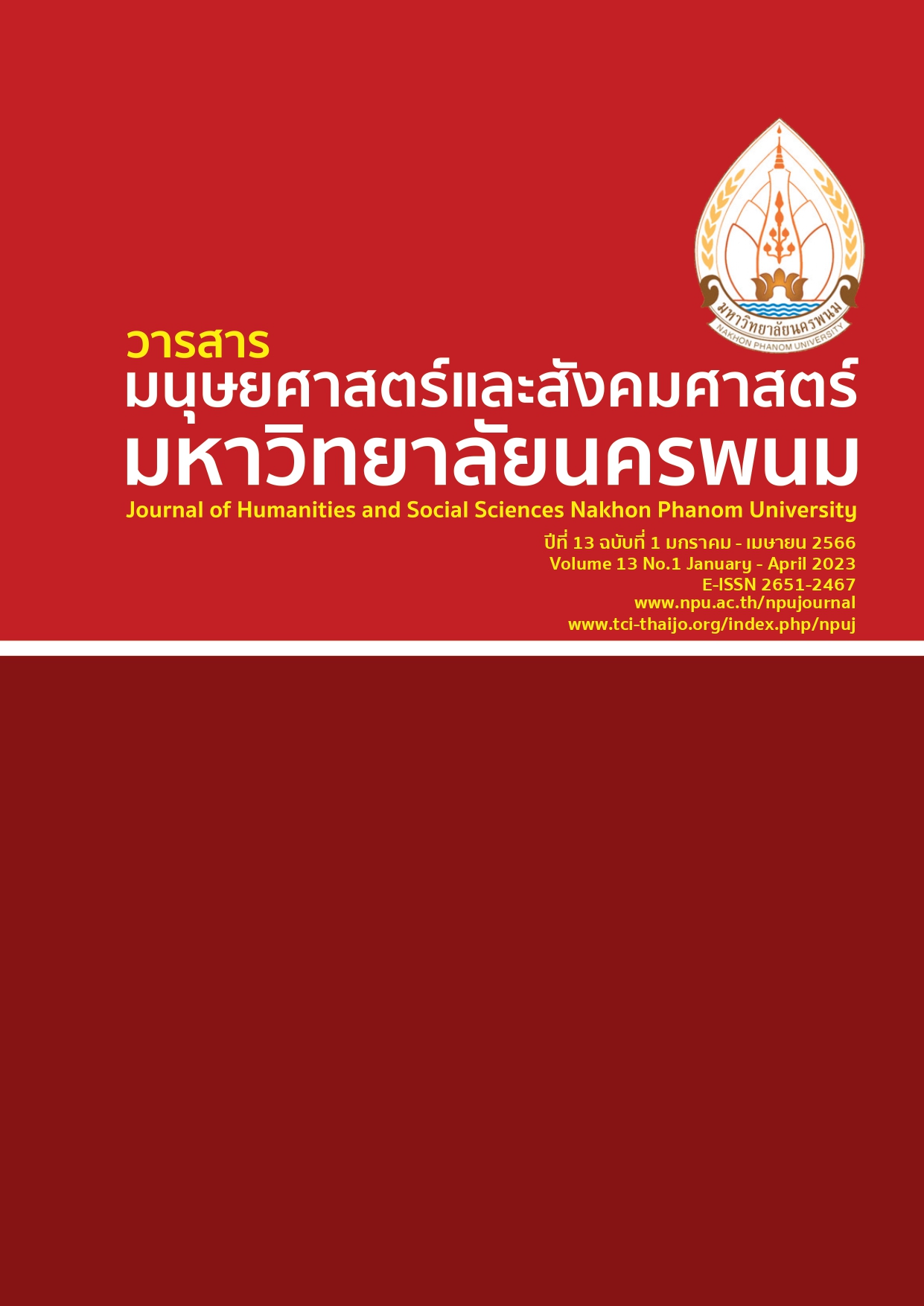Modern Marketing Communication for Sustainable Tourism in Koh Lad E Tan Community
Main Article Content
Abstract
This research is qualitative research which aimed to study travelling behavior of Thai tourists who came to Koh Lad E-Tan community and to formulate a modern marketing communication of the Koh Lad E-Tan community for sustainable tourism development. The key informants were collected from the following 2 groups; the first group consisted of 12 tourists who came to Koh Lad E-Tan community and the second group consisted of 15 interviewees from community leaders, farmers, and entrepreneurs in Koh Lad E-Tan as well as the heads of government agencies that related to Koh Lad E-Tan using purposive sampling. The data was collected by using an in-depth interview and there were semi-structured questions used as a tool of interviewing. The data was decoded analyzed with descriptive statistics. The research's findings showed that 1) most of the tourists’ domicile was in Bangkok and Nakhon Pathom (33.34%). The travelling’s behaviors showed that 32.00 percent of the tourists knew the tourist attractions in Koh Lad E-Tan from online social media. The reason of decision making to visit Koh Lad E-Tan because of the short distance (23.77%) and 91.67 percent of the tourists used personal car. The average cost of traveling to Koh Lad E-Tan is less than 1,000 baht (66.67%). 2) Despite there were many platforms of media used to reach the tourist but a number of views of each media was very little, approximately a hundred, and the content was not kept up to date as well as the video clip is of poor quality. Therefore, to formulate modern marketing community for sustainable tourism of Koh Lad E-Tan, should be active in public relations from every agency’s collaboration, develop the quality, interesting, and easy access media. Moreover, using the word-of-mouth as a viral marketing to build more trustworthiness because it is a direct experience, and a quick way in marketing communication.
Article Details

This work is licensed under a Creative Commons Attribution-NonCommercial-NoDerivatives 4.0 International License.
References
Angela, W. (2018). Understanding the research on millennial shopping behaviors. Retrieved August 2022, From https://www.forbes.com/sites/forbesagencycouncil/2018/06/04/understanding-the-research-on-millennial-shopping-be haviors.
Babcsanyi, C., Suba, A., Iosim, I. and Vaduva, L. (2020). Communication in Tourism Promotion Campaigns. Agricultural Management. 22(3),61-67.
Chulapasars, N. and Lamchachang, S. (2015). Kānthamwičhainaikhon: Kānkhō̜khwāmyin yō̜mdōihaikhō̜mūn lækānkhīanʻēkkasānchīčhǣngkhō̜mūnsamrapʻāsāsamak [Research Involving Humans: Informed Consent and How to Write Participant Information Sheet]. Nursing Journal. 42,201-206.
Hanpongpandh, P. (1997). Technological Investment and News work. Bangkok : Thailand: Feungfa Printing.
Fontana, A. and Frey, J. H. (2005). The Interview: From Neutral Stance to Political Involvement. In: N. K. Denzin, & Y. S. Lincoln (Editors), Collecting and Interpreting Qualitative Materials. (3rd ed). CA : Sage Publications.
Fry, R. (2020). Millennials Overtake Baby Boomers as America’s Largest Generation. Pew Research Center. Retrieved August 2022, from https://www.pewresearch.org/facttank/2020/04/28/millennials-over take-baby-boomers-as-americas-largest-generation/
Fungproa, O. and Mohsrijai, R. (2019). Theknik kān rūaprūam khō̜mūn : kān samphāt [Techniques of Data Collection: Interview]. Retrieved Mar 2022, from https://northnfe.blogspot.com/2019/08/ED256 212.html.
Holloway, C. (2004). Marketing for tourism. England : Pearson Education Limited.
Jittangwattana, B. (2005). Kānphatthanā kānthō̜ngthīeo bǣp yangyư̄n [Development of Sustainable Tourism]. Chiangmai : Chiangmai University.
Jittangwattana, B. (2005). Utsāhakam kānthō̜ngthīeo [Tourism Industry]. Bangkok : Press and Design.
Johnson, P., Buehring, A., Cassell, C. and Symon, G. (2006). Evaluating qualitative management research: Towards a contingent criteriology. International Journal of Management Reviews, 8(3),131–156. https://doi.org/10.1111/j.1468-2370.2006.00124.
Kanato, M. (2007). Withīwitthayākānwičhaichœ̄ngkhunnaphāpnairabopsakhaphāpchumchon [Qualitative Research Methods in Community Health Systems]. (1st ed). Khon kaen Northeastern Academic Development and Substances Information Network, Kon Kaen University.
Keitpiriya S., Busaman S., Phetcaot K. and Chaiwong A. (2020). kān songsœ̄m kānthō̜ngthīeo mư̄ang rō̜ng dūai theknōlōyī sư̄ dičhithan [secondary City Tourism promotion with Digital Technology]. Journal of MCU Nakhondhat. 7(12),436-450.
Kotler, P. and Armstrong, G. (1999). Principles of Marketing. (8th ed). NJ : Prentice Hall.
Kotler, P. and Keller, K. L. (2006). Marketing Management. (12th ed). NJ : Prentice Hall.
Malhorta, N., Hall, J., Shaw, M. and Oppeenheim, P. (2002). Marketing research. An applied orientation. Deakin University.
Ministry of Tourism and Sport. (2014). Kānthō̜ngthīeo chœ̄ng kasēt [Agricultural Tourism]. (1st ed). Bangkok : N/A.
Nawakijpaitoon, L., Pongsakornrungsun, S. and Pongsakornrungsun, P. (2021). Kānwikhro̜ ʻongprakō̜ prūpbǣp kāndamnœ̄nchīwitkhō̜ngnakthō̜ngthīao Klum Millennials Naiprathedthai [Analysis of Factors of Millennial Tourists’ Lifestyles in Thailand]. Journal of International and Thai Tourism. 17(1),18-43.
Office of Nakhon Pathom Province. (2020). Yutthasāt kānphatthanā. [Strategic Development]. Retreived March 2021, from http://www.nakhonpathom.go.th/content/strategy
Pickton, D. and Broderick, A. (2001). Integrated Marketing Communications. London : Prentice Hall.
Popescu, M. A., Nicolae, F. V. and Pavel, M. I. (2015). Tourism and hospitality industry in digital era: General overview. In Proceedings of the 9th International Management Conference, Bucharest, Romania. (pp.163-168)
Prajongkarn, V. and Junanantham, S. (2021). Thāng yǣk thō̜ngthīeo:ʻanākhot phāk kānthō̜ngthīeo Thai dœ̄n yāngrai lang fon tok. phāk sētthamitmahaphāk [Tourism at a crossroad: The Future of Thai Tourism Part How to walk after raining Macro Econometric Sector]. Bangkok : Bank of Thailand.
Research and Development Institute, Rajamangala University of Technology Rattanakosin. (2022). Khrōngkān bō̜rikān wichākān [Academic Service Project]. Retrieved March 2022, from https:// sites.google.com/rmutr.ac.th/ird-academic-services-2564.
Sermchayut, R. (2020). Konlayut kān songsœ̄m kāntalāt samrap kānthō̜ngthīeo chumchon [Promotion Strategy for Community Based Tourism]. Journal of Multidisciplinary Academic Research and Development. 2(4),51-61.
Shimp, T. A. (2000). Advertising promotion. Supplemental Aspects of Integrated. 4,245-273
Sujittavanich, M. and khongkhaluang, D. (2020). Nǣothāng kānsư̄sān kāntalāt phān sư̄ sangkhom ʻō̜nlai nai klum čhēnœ̄rēchan net [Guidelines for Social Media Marketing Communications in Generation Net]. Journal of Roi Kaensarn Academi. 5(2),155-156.
Taichan, P. (2020). Ēkkasān sammanā lakkān talāt [Teaching Document of Seminar in Principles of Marketing]. Lopburi : Chaibadan Technology College.
Werachayo, P., Sirimedho, P. P. and Punyawutpreeda, P. (2022). Kānmī sūanrūam nai kānčhatkān kānthō̜ngthīeo chœ̄ng kasēt yāng yangyư̄n khō̜ng ko̜ lat ʻī thǣ naʻamphœ̄ sām phrān čhangwat Nakhō̜n Pathom [Participation in Sustainable Argotourism Management of Koh Lad E Tan, Sampran District Nakhon Pathom Province]. Journal of Politacal Sciences Mahamakut Buddhist University, 2(5),49-61.


